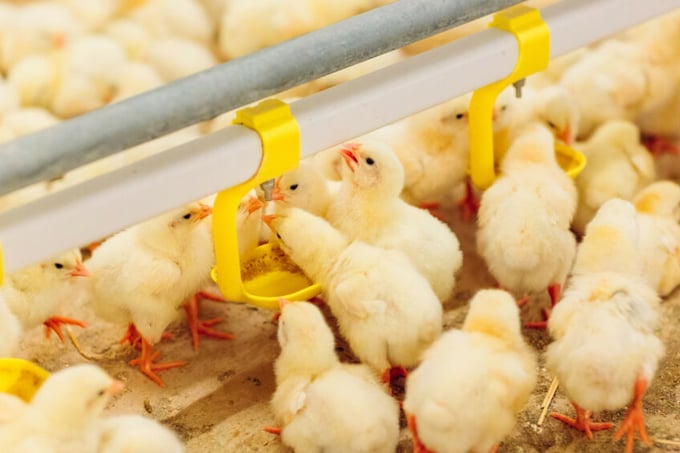May 31, 2025 | 22:21 GMT +7
May 31, 2025 | 22:21 GMT +7
Hotline: 0913.378.918
May 31, 2025 | 22:21 GMT +7
Hotline: 0913.378.918

A recent study has has characterised the dynamic patterns of feed intake and their association with growth performance. Photo: Canva
Over the past few decades, significant improvements in the feed intake and feed utilisation efficiency of broilers have been achieved through advanced breeding procedures, although dynamic changes in feed intake and their effects on the feed conversation rate have remained unclear.
Chinese scientist from the State Key Laboratory of Animal Biotech Breeding and Frontier Science Centre for Molecular Design at China Agricultural University in Beijing, carried out a study measuring individual weekly feed intake and body weight of 274 male broilers to characterise the dynamic feed intake patterns and investigate their relationship with growth performance.
The groups were Cornish (CC group, N=91), White Plymouth Rock (RR group, N=88), and their hybrid (CR group, N=95). The broilers were from 2 purebred lines and their crossbreed and measurements were collected from 4-6 weeks of age. Throughout the experiment, the birds were provided with ad libitum access to feed and water. Broiler weight was measured at 21, 28, 35 and 42 days.
Overall, a continuous increase in the weekly feed intake occurred from 4-6 weeks, while the body weight gain reached an inflection point in week 5. The dynamic change in weekly feed intake was found to follow 3 distinct patterns:
The prevalence of these patterns was similar in the purebred and crossbred populations with pattern 2 being the most frequent followed by a modern proportion of pattern 1 and then the lowest proportion of pattern 3.
Broilers following patterns 1 displayed significantly better growth performance and feed utilisation efficiency than those following pattern 3, emphasising the importance of maintaining good appetite in the last stage of broiler production.
In summary, the study has characterised the dynamic patterns of feed intake and their association with growth performance with the scientists saying their results offered a new foundation for improving utilisation efficiency and investigating feeding regulation in broilers.
(PW)

(VAN) Vikas Rambal has quietly built a $5 billion business empire in manufacturing, property and solar, and catapulted onto the Rich List.

(VAN) Available cropland now at less than five percent, according to latest geospatial assessment from FAO and UNOSAT.

(VAN) Alt Carbon has raised $12 million in a seed round as it plans to scale its carbon dioxide removal work in the South Asian nation.

(VAN) Attempts to bring down the price of the Japanese staple have had little effect amid a cost-of-living crisis.

(VAN) Fourth most important food crop in peril as Latin America and Caribbean suffer from slow-onset climate disaster.

(VAN) Shifting market dynamics and the noise around new legislation has propelled Trouw Nutrition’s research around early life nutrition in poultry. Today, it continues to be a key area of research.

(VAN) India is concerned about its food security and the livelihoods of its farmers if more US food imports are allowed.